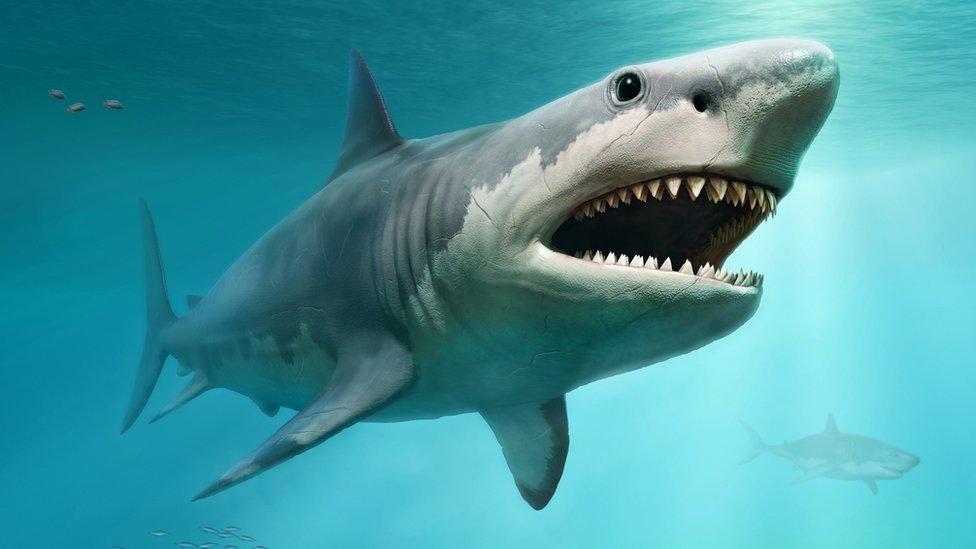Megalodon kept its body temperature 7C warmer than the sea
- Published
- comments

New research has shed light on why these enormous ocean predators went extinct
Researchers have discovered that Megalodons having to keep warm could be part of the reasons they became extinct.
The megalodon was a gigantic prehistoric shark that lived in warm seas millions of years ago, and is thought to have been one of the largest fishes to ever exist.
The fearsome ocean predators could grow to around 18 metres in length - that's longer than two double-decker buses! - with razor sharp teeth that could be as grow up to 18 centimetres long.
Now, after studying some of the ancient shark's teeth, researchers think that keeping its body temperature 7 degrees Celsius warmer than the ocean used up a lot of energy - which might give them a better idea of why it went extinct 3.6 million years ago.
Comparing a Megalodon tooth to a great white shark tooth shows how huge the fish must have been
As part of the research, which was published in the Proceedings Of The National Academy Of Sciences journal, scientists wanted to understand more about the Megalodon and the team of researchers studied fossils of their teeth.
This is because their teeth can reveal more about where an animal lived and the types of food it ate, and even information like what the seawater was like where it lived and its body temperature.
Megalodons belonged to a group of sharks called mackerel sharks, which today includes creatures like the great white and thresher shark.
While most fish are cold-blooded - with body temperatures that are the same as the water around them - mackerel sharks keep the temperature of all or parts of their bodies warmer than the water around them.
Randy Flores, a UCLA student, who worked on the study, said: "Because teeth form in the tissue of an animal when it's alive, we can measure the... composition of fossil teeth in order to estimate the temperature at which they formed and that tells us the approximate body temperature of the animal in life."
They learnt that the Megalodon was able to keep its body temperature around 7C warmer than the ocean it swam in.
How a human diver might have compared to the real Meg
The problem with keeping your body that much warmer all the time, is that it takes A LOT of energy, meaning the Megalodon would have to be constantly hunting and eating.
Mr Flores said: "Maintaining an energy level that would allow for Megalodon's elevated body temperature would require a voracious appetite that may not have been sustainable in a time of changing marine ecosystem balances when it may have even had to compete against newcomers such as the great white shark."
The researchers think that sustaining this amount of eating and keeping warm was super-tough which might be one pf the reasons why the Megalodon became extinct.
The word Megalodon simply translated means - large tooth.
The prehistoric shark lived from about 23 million to three million years ago
- Published9 February 2022
- Published9 September 2019
